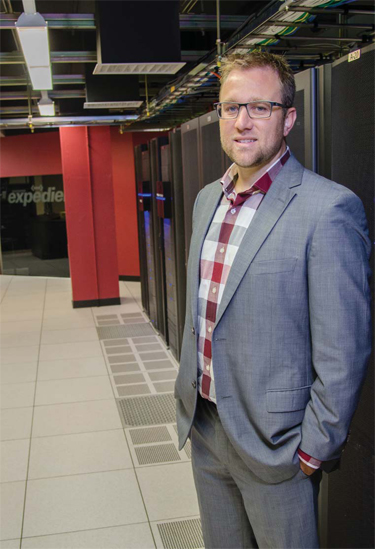Take On Cloud Data Center Goliaths
By The Business Solutions Network
This cloud services provider is beating out huge competitors — and realizing double-digit revenue growth — by being a stickler on the basics.

Exposing competitors’ practices of oversubscribing customers’ RAM, CPU, and storage is just one way Expedient differentiates itself, says John White, the company’s director of product strategy.
Photo By A.J. Marschke
When you think about the biggest cloud service providers in the world, names like Amazon, Google, Microsoft, IBM, and Rackspace come to mind. In fact, according to a report released by Synergy Research Group earlier this year, these companies comprise 54 percent of the $16 billion cloud market. Lots of IT solutions providers have learned the hard way that it’s no easy task to compete against these behemoths and have found it more worthwhile to join them.
Expedient isn’t one of the joiners, however. Founded in 2001 with the sole focus of offering off-site IT infrastructure solutions and services, this solutions provider now manages multiple petabytes of storage and operates 11 data centers in seven cities with more than 300,000 square feet of servers and networking appliances under management. The fact that this midsize player competes against much bigger rivals — and wins — should inspire other small to midsize IT solutions and service providers to do the same.
Don’t Subscribe To Cloud Oversubscribing
One of the reasons many of the big cloud and Internet service providers (ISPs) are able to offer their services so competitively can be found in the fine print of their contracts. For example, if you’re paying for 50 MB of bandwidth from your ISP, that’s what you should be getting, right? Often, that’s not the case, says John White, director of product strategy at Expedient. “If you read the fine print, you’ll see that the company is promising you ‘up to’ 50 MB,” he says. “What they’re doing behind the scenes is sharing the circuit that provides your bandwidth among nine other companies. The same thing happens among cloud service providers with RAM, CPU, and storage. They’re banking on the fact that all 10 companies won’t use the maximum capacity at the same time.”
Furthermore, in the event a worstcase scenario did occur, it’s difficult for the customer to pinpoint the slowdown in performance on the cable company or cloud service provider. After all, there are a myriad of other factors that can contribute to the same problem, such as internal networking problems, application issues, and malware, to name a few. Unless someone is monitoring the wide-area network, nothing is ever said.
Expedient has built its business on exposing the above-mentioned business practice of oversubscribing services. It guaranteeing its customers that when they buy one vCPU (virtual CPU) of compute, they’re getting the full amount every time they access it. “We’ve produced reports showing prospects several areas where we provide a higher-value service than our big-name competitors,” says White. “In fact, the statistics were so heavily in our favor that it caused skepticism over the validity of our tests and our test methodology. So we took it a step further and partnered with cloudspectator. com, a third-party cloud consultant and benchmark tester that allows us to compare our IaaS [Infrastructure as a Service] offerings against any other cloud provider in real time.”
Create A Security Differentiator
Another area Expedient differentiates itself from competitors is security. Similar to the compute power and bandwidth sharing described earlier, many of Expedient’s competitors use the same firewall to protect multiple customers’ IT environments. “About five years ago we partnered with Juniper Networks through value-added distributor Securematics [see sidebar on page 28 to learn more about this partnership] to create virtual firewalls that allow us to segment each customer running IaaS processes in our data centers,” says White. What this means is that if one of our customers suffers a data breach, there is no way for an attacker to gain access to other customers’ data. Since many of our customers are required to meet regulatory and industry compliance requirements such as HIPAA or PCI (Payment Card Industry), this creates a significant sales advantage.”
Over the past couple of years, one trend the cloud service provider has observed is customers that formerly wanted to outsource the management of most of their IT security services now want visibility and control of those services. “We’ve responded to this trend by simplifying our user interface and offering self-service and self-management capabilities,” says White. “We allow customers to put together their own a la carte security services. For example, we offer encryption, ID management, two-factor authentication, and script logging as individual services. If a customer decides it only wants to choose ID management and script logging, that’s fine. We may consult with them to gain an understanding of why they’re making a particular selection, but ultimately we want to empower them to make the decision they believe is best for their organization.”
Boost Efficiency, Foster Leadership
Doubling in size in five years doesn’t come without its challenges, however, and one of the biggest struggles Expedient had to work through was ensuring high-touch customers continued receiving the attention they needed. “Within the past couple of years, we restructured our delivery teams so that engineers skilled in high-touch services such as email migration projects were always assigned to those tasks,” says White. “And, engineers who preferred low-touch projects such as provisioning firewalls and servers would always be assigned those types of projects. Additionally, we automated several of our core processes, such as provisioning operating systems and firewalls, which greatly reduced the time required to roll out new services.”
As Expedient’s business grew and its engineers’ roles became more specialized, the company recognized that it was going to be more difficult for new hires to get acclimated to its work environment. So it took a couple of steps to offset this challenge, including ramping up its training and hiring senior leaders within its industry. “We’re one of the few companies that fully covers the cost of training for our employees for both technical certifications and college coursework. To date our team has completed 215 certifications in 21 different disciplines,” says White. “We use both industry standard training classes for certifications as well as other customized training programs from local universities that include hands-on training followed up with WebEx reinforcement training.”
Even when it hires senior leaders with years of industry experience, Expedient is careful not to put a new hire into a management position too soon. “We always start new hires in contributor roles, so that they can learn how our business works and learn our culture before they start directing the business,” says White. One example is a VP hired by Expedient to run its Memphis facility. “We started this person as a project manager,” he says. “From there, he transitioned to running the service delivery team and then after that he was moved into the regional vice president role that he holds today.”
Expedient believes this transition process is key to preserving its core fundamentals, which White summarizes as being a young, scrappy company. “No matter how big we get, we always want each employee to take responsibility for their actions,” he says. “For example, if an employee sees a piece of paper on the floor, we want them to take care of it rather than passing it off as someone else’s problem.”
Another part of Expedient’s smart growth strategy entails offering tailored services. “This is an important distinction from companies that offer custom services,” says White. “The former is akin to hemming the pants on a suit whereas the latter would be like choosing a different fabric and design for a suit. When companies offer custom services they can easily get into bad places where they no longer have enough resources to take care of their customers. Our customers run their businesses in our data centers, and they rely on us to keep their applications and services up and running all the time, so we can’t afford to jeopardize that trust. The fact that 80 percent of our customers are located within an hour of one of our data centers is another testimonial to the importance of the trust factor. Being able to drive to our data center and see our power generators, fire control systems, IT equipment, and to personally meet our support staff gives them peace of mind that their data and computing resources are in a safe and trustworthy environment.”

“We always start new hires in contributor roles, so that they can learn how our business works and learn our culture before they start directing the business.”
John White, director of product strategy, Expedient
Know (And Respect) Your Limits
Some may mistakenly think that Expedient’s success lies in staying on the cutting edge of technology. But White says that’s not exactly the case. He insists that being a “fast follower” is actually more of a differentiator. “We’ve learned that not every new technology is something we should be selling and supporting internally,” he says. “Virtual desktop services is one example that comes to mind. On two occasions, we attempted to offer this service, but we quickly recognized that it’s totally different from our core competency, which is selling and supporting IT infrastructure. If a customer is a candidate for virtual desktop services, we’ll outsource this to a partner that specializes in that area to avoid stretching our internal resources too thin.”
While some may disagree with Expedient’s approach, it’s hard to disagree with the results the company has been experiencing. “Five years ago, we had 120 employees and operated in four cities, including Baltimore, Boston, Cleveland, and Pittsburgh,” says White. “Today, we have expanded into three additional cities: Columbus, OH; Indianapolis, IN; and Memphis, TN. And, we’ve grown to 250 employees.”
Over the last five years, Expedient has deployed more than $100 million to build out new cloud and data center infrastructure without taking on any debt. Last year the company reached double-digit revenue growth over 2013, and this year it’s on track to do it again.

